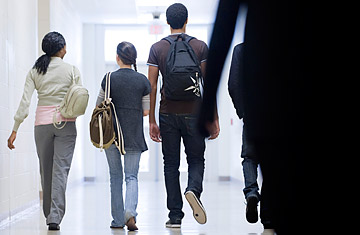
(2 of 6)
Gwendolyn Lawson lost track long ago of exactly how many times the New Orleans schools suspended her niece, Janeisha, a ninth-grader. "Sometimes it feels like every two weeks she's being put out," Lawson said in an interview last February. Janeisha lives with her aunt.
The state-run Recovery School District, which has operated most of the schools Janeisha has attended in recent years, posted an out-of-school suspension rate of 11% for the 2010–11 school year. That was far lower than several area charter schools. Sojourner Truth, which will close down at the end of this school year because of poor test scores, reported that it suspended more than 40% of the students at least once last year.
Lawson understands why administrators would need to suspend her niece for fighting, particularly if Janeisha caused the altercation. But she does not understand why the slender teen gets sent home for talking back to a teacher or walking out of class. Often, she says, academic frustration causes such "willful disobedience" or "disrespect to authority," as the schools describe it. "I'd be much happier if they had her clean the cafeteria, even paint the building," Lawson says.
Since Hurricane Katrina in 2005, Janeisha has bounced between four different schools in New Orleans. Each school suspended her multiple times. It did not matter if the schools were charters. It made no difference whether her teachers were novices or experienced professionals. Eventually Janeisha began ripping up the suspension forms in her anger over being sent home yet again.
Recovery School District superintendent Patrick Dobard, who assumed the post in January, says the district's "priority is to make sure we have kids in school." But since so many of the district's schools are charters, many set their own policies as to what is a suspendable offense.
Dobard announced in April that charter-school expulsion cases will now be reviewed by the central office. However, he anticipates no such centralization when it comes to suspensions, partly to protect charter schools' autonomy when it comes to student discipline. But he plans to convene a series of working groups this summer aimed at lowering suspension rates. "I still hold the belief that we need to suspend kids less," he says.
Janeisha helps her aunt clean and garden while on suspension. But she never does schoolwork, because her teachers do not assign her any. "They just say, if I'm suspended, it's on me to catch up," Janeisha says. The lost class time means she falls further behind, her frustration builds, and she grows increasingly likely to act out more, she and her aunt say.
Indeed, the online version of the district's code of conduct from 2010–11 states that suspended students are to be counted as absent, given failing grades for the suspended days and not allowed to make up work. Dobard says he was not aware that had ever been the district's policy. The current policy is to let individual principals make the call as to whether students receive work while on suspension, he says.
Nationally, school and district policies vary tremendously when it comes to what students do — or don't do — while on suspension. Some districts, including New York City, keep suspended students in school settings such as designated suspension rooms or alternative schools. Other districts assign them work to be done at home. Still others do nothing and even make it very difficult for students to make up work.
